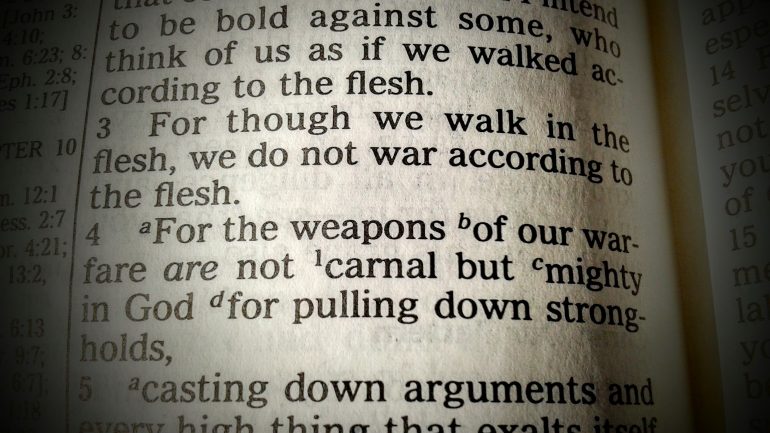Yesterday I had lunch with a friend who works on the staff of a nearby church. He shared with me that they were having conversations about what to do if an extremist attack took place at one of their services or programs. According to my friend, much of the conversation centered on the idea of providing armed security (off-duty police officers) as well as intentionally arming and training some staff or congregation members.
At that point our conversation focused on the history of safety and protection related to the persecution of the early church (both during the New Testament period and the following two centuries leading up to Constantine). In no case during those first three hundred years, do Christians ever discuss favorably or condone defending themselves with anything other than the Word of the Gospel. On the contrary early Christian writers (in the New Testament and later) consistently discussed the honor and gift it was to suffer for the sake of Christ. Notably, they also expected persecution. It was not surprising to them. They did not, on the whole, pursue persecution for its own sake, but they did expect it as a natural extension of taking up the cross to follow Jesus, suffering like Him.
A Similar But Very Different Conversation at the Mosque
Coincidentally, I recently visited the local Masjid (mosque) to meet with a new friend who is on staff there. My new friend had invited me to wait while they performed the noon-time prayer, so I sat in the back of the room while the small group of men gathered and prayed. Afterwards, while we were talking about a number of issues, I asked my Muslim friend (given the current state of rhetoric in our society) if he ever worried about someone coming to their gathering and attacking them. He said they had discussed it a few times, with some members of their community expressing deep concern, even wondering if they should have armed security guards. The concern is real, as their community in general and members of the staff in particular have received threats of violence and even death. He said, however, that the Imam’s position was something like, “My life belongs to God. If someone wants to take it, I have already surrendered it. It belongs to God.”
An Issue of Trust
At the lunch conversation with my church worker friend, I found the differences between the nature and emphases of the discussions between the two groups—the Christian leaders and the Muslim leaders—quite striking. One group has had no threats at all and speaks in terms of defense and guns. The other has received real threats and speaks in terms of surrender and God.
I wish that conversations among Christian leaders sounded more like the latter.
And, please note, this is not about a lack of awareness about being prepared (I do think having a plan for this type of event is better than not having one, even if it is utterly unlikely to ever be used, kind of like tornado or fire plans). Nor is this about “gun control”. For me, again, this is about the nature and emphasis of where our hearts and trust are, in Whom we trust and not in what.
“Should Christians Be Encouraged To Arm Themselves”
Timely in relation to yesterday’s conversation, today John Piper weighs in on the topic with his post, “Should Christians Be Encouraged To Arm Themselves“, where he addresses many of the scriptures that have also been on my mind and in my conversations lately. I highly encourage anyone who wants to get some scriptural perspective on this issue to read Piper’s article and seek God’s guidance during this time of fear and anxiety. Here is one quote:
Few messages are more needed among American Christians today than 1 Peter 4:12: “Do not be surprised at the fiery trial when it comes upon you to test you, as though something strange were happening to you.” Fiery trials are not strange. And the trials in view are hostilities from unbelievers, as the next verse shows: “But rejoice insofar as you share Christ’s sufferings.” These trials are normal. That may not be American experience, but it is biblical truth.
Peter’s aim for Christians as “sojourners and exiles” on the earth is not that we put our hope in the self-protecting rights of the second amendment, but in the revelation of Jesus Christ in glory (1 Peter 1:7, 13; 4:13; 5:1). His aim is that we suffer well and show that our treasure is in heaven, not in self-preservation.
